Rubbish Removal Adelaide
Explore the essential role that efficient rubbish removal plays in maintaining the cleanliness and sustainability of Adelaide. This comprehensive guide covers everything from choosing the right service provider to understanding the impact of effective waste management.
Overview of Rubbish Removal Services in Adelaide
Importance of Efficient Waste Management
Efficient waste management is crucial for maintaining public health, conserving natural resources, and ensuring a sustainable environment. In Adelaide, this involves a range of practices from regular garbage collection to specialized hazardous waste handling.
Regulations Surrounding Waste Disposal in Adelaide
Adelaide adheres to specific regulations that dictate how waste should be managed. These rules help mitigate the impact on the environment and ensure that waste disposal practices are sustainable and lawful.
Types of Rubbish Removal Services
Residential Waste Removal
This service caters to the everyday disposal needs of Adelaide’s households, encompassing regular trash collection and recycling services.
Commercial Waste Disposal
Focusing on businesses, these services manage larger waste volumes and include document shredding, electronic waste disposal, and construction debris management.
Hazardous Waste Management
Special procedures and treatments are required for hazardous waste, which includes materials like chemicals, batteries, and medical waste.
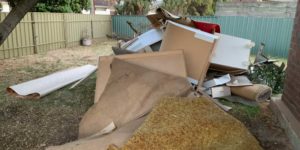

Choosing the Right Rubbish Removal Company
Factors to Consider
When selecting a rubbish removal service, consider factors such as pricing, service options, environmental policies, and the company’s reputation.
Using a Local Rubbish Removal Company
Opting for a local rubbish removal business like Adelaide Rubbish offers several distinct advantages that can be particularly beneficial for residents and businesses:
- Enhanced Local Knowledge: Adelaide Rubbish possess intricate knowledge of the specific waste management regulations and recycling opportunities within the Adelaide community. This understanding ensures that waste is disposed of in compliance with our local laws and in the most environmentally friendly manner possible.
- Personalised Customer Service: Smaller, local companies often provide more personalised services. We can adapt our services to fit unique customer needs and preferences, which larger national chains like 1300 rubbish or 1800 Got Junk may not accommodate as flexibly.
- Supporting Local Economy: By hiring our team, you contribute directly to your local economy. This support helps to create and maintain jobs within the community and fosters local business growth.
- Quick Response Times: We typically have shorter response times for both scheduled pickups and last-minute requests. Our proximity allows for faster deployment of services, which can be crucial during urgent clean-ups or unforeseen waste management needs.
- Building Community Relationships: Working with Adelaide Rubbish helps build stronger relationships within the community. Our staff often participate in local events and engage in community service activities, enhancing community ties and mutual support.
- Environmental Benefits: Local rubbish removal firms may also minimize the carbon footprint associated with transporting waste to disposal sites, thanks to their proximity to these locations. This can lead to more sustainable waste management practices.
Choosing a local rubbish removal firm not only provides practical benefits in terms of service quality and flexibility but also contributes to broader community and environmental benefits, making it a worthwhile consideration for those looking to manage their waste responsibly.
Reviews and Recommendations
Explore what current and past customers say about their experiences with Adelaide Rubbish
The Process of Rubbish Removal in Adelaide
Step-by-Step Guide
Here are the typical steps in a rubbish removal process, from initial contact to disposal:
- Initial Contact: Customer contacts the Adelaide rubbish to inquire about services and availability.
- Quotation: The service provider assesses the amount and type of waste to be removed, either through photos sent by the customer or an on-site visit, and then provides a price quote. Our price per cubic metre is offered as a guide.
- Scheduling: Once the quotation is accepted, the customer and Adelaide Rubbish staff agree on a date and time for the waste pickup.
- Waste Collection: The Adelaide rubbish removal team arrives at the scheduled time, collects the waste from the designated area, and loads it onto their vehicle and trailer.
- Sorting and Transportation: The collected waste is taken to a sorting facility where recyclable and reusable items are separated from non-recyclable waste.
- Disposal and Recycling: Non-recyclable waste is transported to a landfill or incineration facility for disposal. Recyclable materials are sent to appropriate recycling facilities to be processed and reused.
- Confirmation of Service Completion: The service provider may send a follow-up message or receipt confirming the completion of the service and detailing the disposal methods used.
These steps ensure that waste is efficiently removed and properly processed, minimizing environmental impact.
Identification and Sorting of Waste
Sorting waste into specific categories like recyclables, organics, and landfill items is crucial for several reasons:
- Efficiency in Recycling: Proper sorting ensures that recyclable materials such as paper, plastics, and metals are uncontaminated, which increases their recycling efficiency and the quality of the new products made from them.
- Reduction in Landfill Waste: Separating organic waste for composting and recycling other materials reduces the volume of waste sent to landfills, helping to extend landfill life and reduce associated environmental impacts.
- Environmental Protection: Correctly sorting waste helps prevent the release of harmful chemicals from landfills and incinerators into the air, soil, and water, protecting ecosystems and human health.
- Economic Benefits: Efficient sorting and recycling can lower waste management costs and generate income from the sale of recycled materials and compost.
- Community Education and Engagement: Sorting waste educates the public about sustainable practices and fosters a culture of environmental responsibility, encouraging further positive behaviors in waste management.
Transportation and Disposal Methods
Discover the methods used in transporting and disposing of waste in Adelaide, including the use of modern logistics and environmentally friendly techniques.
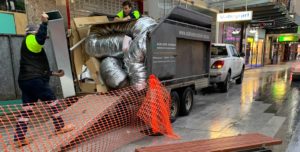
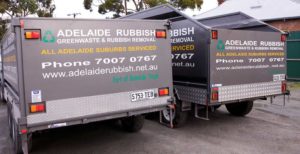
Recycling and Waste Reduction Initiatives
Local Recycling Programs
Adelaide’s efforts to promote recycling and reduce landfill waste include:
- Kerbside Collection Services: Regular collection of recyclables, organics, and general waste.
- Soft Plastics Recycling Trial: A trial program to collect and recycle soft plastics from residences.
- Resource Recovery Strategy: A plan focusing on minimizing waste and increasing recycling through community education.
- Circular Economy Initiatives: Programs designed to support the recycling of materials and reduce the overall consumption of new resources.
- Community and Business Grants: Funding for projects that support sustainability and environmental initiatives, such as the Carbon Neutral Catalyst Grants and Community Impact GrantsTips for Reducing Waste at Home and Work
Tips for Reducing Waste at Home and Work
- Smarter Shopping:
- Buy in Bulk: Purchase food and other goods in bulk to reduce packaging waste.
- Choose Reusable Over Disposable: Opt for products with reusable or refillable options rather than single-use items.
- Buy Secondhand: Consider buying used products when possible to save items from ending up in landfills.
- Avoid Excessive Packaging: Select products with minimal or recyclable packaging.
- Bring Your Own Bags: Always carry reusable shopping bags, produce bags, and other containers.
- Reducing Usage:
- Plan Your Meals: Reduce food waste by planning meals ahead and buying only what you need.
- Use What You Buy: Make a conscious effort to use all the products you buy before they expire.
- Repair and Upcycle: Fix broken items or repurpose them instead of discarding them.
- Digital Subscriptions: Opt for digital versions of newspapers, magazines, and bills to cut down on paper waste.
- Energy-Efficient Appliances: Use appliances that are energy-efficient and consume less power and water.
- Recycling:
- Know What to Recycle: Familiarize yourself with local recycling rules—what can be recycled and how to sort items.
- Proper Disposal of Electronics: Recycle e-waste like batteries and electronics through dedicated recycling programs.
- Composting: Start composting organic waste like food scraps and yard waste at home to reduce garbage and create nutrient-rich soil.
- Recycle Hazardous Waste Properly: Dispose of hazardous materials like paints, oils, and chemicals at designated facilities.
- Educate Yourself and Others: Stay informed about recycling technologies and share knowledge with your community.
By adopting these habits, you can significantly reduce your waste footprint, contribute to environmental conservation, and potentially save money.
Benefits of Recycling for the Environment
- Resource Conservation: Recycling reduces the need for raw material extraction, conserving energy and water.
- Emission Reduction: Using recycled materials in manufacturing emits fewer greenhouse gases compared to processing virgin resources.
- Economic Support: Recycling creates jobs and supports local industries, promoting a sustainable circular economy.
Costs Associated with Rubbish Removal
Pricing Structures
In Adelaide, rubbish removal services utilise different pricing models that cater to various needs, primarily including flat fees and volume-based charges:
- Flat Fee Pricing:
- This model involves a fixed rate for rubbish removal regardless of the quantity or type of waste. It’s often used for specific services like mattress removal or electronic waste disposal, where the scope and effort are predictable.
- Flat fees are advantageous for customers who prefer straightforward pricing without surprises. This model is also common for scheduled services, such as regular garden waste removal.
- Volume-Based Pricing:
- Under this model, charges are based on the volume of waste removed, typically measured in cubic meters or by the size of the bin used. This approach is frequently adopted for general household or commercial waste removal.
- Volume-based pricing is beneficial for customers with variable amounts of waste, as it aligns the cost directly with the service used. It is particularly suitable for large clean-ups, renovations, or irregular waste disposal needs.
Each pricing model suits different types of waste removal tasks, and the choice between them often depends on the customer’s specific requirements, the nature of the waste, and the frequency of the removal service. Adelaide Rubbish offers both options to accommodate a wider range of customer needs.
Understanding Additional Fees
When engaging rubbish removal services, it’s important to be aware of potential extra charges that may apply under certain circumstances. These additional costs can vary depending on the specifics of the job:
- Oversized Items: Large items that are difficult to handle, such as piano’s, furniture or large pieces of construction debris, may incur additional fees. This is due to the extra effort required for handling and the space they occupy in our disposal vehicles.
- Extra Pickups: If the job requires more than the standard number of trips to clear all the waste, additional pickup charges may apply. This is common in extensive clean-out projects where the volume of waste exceeds initial estimates.
- Hazardous Materials: Disposal of materials that are hazardous and require special handling, such as chemicals, asbestos, or certain electronic items, often comes with higher fees. These materials need to be processed differently to adhere to environmental regulations.
- Accessibility Issues: If the waste is in a location that is hard to access, leading to longer loading times or requiring special equipment, extra charges may be applicable. This could include waste that is located in narrow alleyways, behind buildings, or upstairs without elevator access.
- Weight-based Charges: Some services may also charge based on the weight of the waste, especially for construction debris, which can be heavier than household waste. Weight fees compensate for the increased cost of disposal at landfill sites.
Adelaide Rubbish will always give you a clear understanding of the total cost.
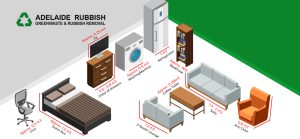
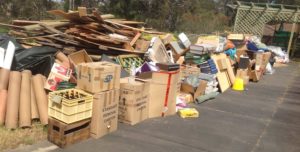





Recent Comments